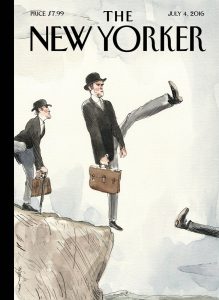About Brexit, your broker is surely saying, “Keep calm, carry on, stay the course.” Sinking ships come to mind. Markets hate uncertainty. They also make big bad bets. So do bookies. Online British Betting websites have long been a favorite barometer for predicting Oscar winners and things like this. Not so fast. They were 70% sure that Britain would not exit.
Hollywood Tycoons seem happy about the short-term benefits of a lower pound on blockbuster production at Pinewood. But what about rental and production companies in England who purchase equipment from Europe and elsewhere? And what of future EU co-production deals?
FDT Friends and colleagues weighed in today. More will surely follow—to be added below.
The New Yorker cover, above, was inspired by Monty Python’s “Ministry of Silly Walks.”
The opinions in this article do not necessarily represent the positions of the companies these individuals run or work for.
Joerg Pohlman, Managing Director of ARRI: Politically a very regrettable decision that damages the integration project that, overall, has been extremely positive for Europe. Economically, time will tell what the consequences will be, and this will heavily depend on how the Brexit is executed and what bilateral agreements are put in place. There are definitely sectors that will be affected more, such as finance. London will be taking a hit as one of the major international hubs. I don’t think, though, that there will be substantial negative impacts for the film industry which is global and much less dependent on European influences.
Nick Rashby, President of AJA: So far I’ve only heard that “business will go on”, “there will a slight blip, but then we will do what needs to be done to keep business moving”. We’ll see.
Les Zellan, Chairman of Cooke: From a philosophic and self-governing point of view, they made the right decision. Whether it will be good for business, we don’t know. England has been independent for centuries. They’ve only been in the EU for 23 of those years. My gut feeling, once dust settles, emotions die down, is that an equitable solution will be found. At the moment, 70% of decisions are made in Brussels by bureaucrats. It is not going to be as bad as the doom-sayers say. This is recent history. Time will tell.
Dr. Frank Holzer, ACM GmbH, Member of Leica Camera AG Supervisory Board: I was quite flabbergasted; this was not expected. It puts an end to decades of Europe getting closer. Austria had 20 years of negotiations before it entered the EU. Could this be the unravelling and development of Europe becoming more nationalistic? Or maybe it’s a big fuss for nothing. Perhaps Britain can negotiate bilateral treaties with similar effects enjoyed by Norway and Switzerland. Broad implications will be seen as short-term advantages of a lower pound. But Brexit makes it harder to move between countries, to travel freely. Austria may suffer, because as the pound weakens, there will be less tourism to Europe because of higher exchange rate costs. The financial industry may be affected. Populist movements may build momentum. Of course, the British Parliament could ignore this referendum.
Terry Carey, Managing Director of Tiffen International: The EU exit result has only just hit home here in the UK. Although we will have turmoil for a while, I believe the markets will settle quickly as our economy is much stronger and in better shape than most of the other members of the EU. As with any change, uncertainly is the part nobody wants and I think the two critical areas for the UK film industry are ensuring the Pound remains strong in the currency markets and we retain our position as the leading financial base within Europe. The real upside of Brexit is we can now strengthen our position in the world by attracting more outside investment by having less bureaucracy, more freedom to exploit the established and renowned British skills in movie making, and being more competitive than rival countries. Time will tell, as there is an element of doom and gloom from certain sectors, but there is also excitment and a feeling of positivity currently from others at Pinewood.
Hollywood studio executive, speaking off the record: No major effect for big budget US productions filming in England for the next 2 years. Most contracts are already in place, and 2 years is the time given for UK to exit EU. On the positive side, the pound is lower so it is less expensive to film there. Negative: Studios lose in exchange rate from exhibition receipts. Same with Euro. Smaller budget films may get more US funding for filming in UK and Europe. Film incentives are important to the economies of UK, Hungary, and France. It may be tough for rental houses and infrastructure because of increased costs to purchase equipment, tariffs, customs fees. Could impact studio development because of confusion over what systems will be in place.
Carey Duffy, European Sales Director at Cooke Optics: A few things stand out to consider. Will the government’s tax break still continue? This is a major factor. Trade agreements and free movement of equipment (Carnets?) are a massive issue for rental companies based in the UK. No next day freight of that lens you need if Carnets are reintroduced. How will this affect studio expansion? I think the post world has the most to fear as companies may set up in the E.U. This could mean Dublin/Ireland, who would benefit as it’s English speaking and only 45 min from London by plane. Dropping pound should be good for UK manufacturers. Not good for UK customers buying cameras from the continent. It won’t be good for commercial production as businesses can’t see what’s coming next, so budgets will be static or will shrink. I’m not saying that the E.U. was perfect–far from it–but the negative xenophobic fear this vote has caused is not good. For the country, it has opened up a can or worms that no one considered. Scotland could leave the union. All the money the E.U has poured into Ulster to heal divisions has been a positive factor. This is a melt down of the political establishment. And will we be able to get a good cup of Italian Coffee, Spanish Tapas, Polish bread, French Cheese, or will it just be chips, chips and more chips?
Arato Ogura, Regional Sales Manager at Carl Zeiss Co. in Japan: The general public in Japan think they have made a terrible mistake in England. It calls into question the complexity of UK societies. If the referendum results legally influence UK’s directions, many Japanese firms will pull out from the UK and move to other EU capitals. Film Industry reaction: many British film productions have been financed by EU film organizations, so future projects may be frozen. British-made content may become very expensive among EU film/TV market (less chance to sell in the future).
Amnon Band, President of Band Pro Film & Digital: It’s a shocker, a game-changer and will affect our business. The vote had nothing to do with economics. It was driven by immigration and the social problems that come with it. Most EU countries are experiencing shift to right. This has happened before, in most countries, on the eve of a social revolution. The problem in the 21st century, it is a step backwards. Europe has cultural budgets for independent films and worthy projects. England just cut themselves off from EU production grants. On the motion picture equipment side, suddenly there will be customs, carnet, slowing things down. I predict either another vote, or Scotland and N. Ireland will withdraw from the UK and remain in the EU. Hollywood executives who see a lower pound will be surprised when the studios raise prices or change to a dollar base. Anyone who voted in favor will regret it. It will affect our industry.
Gianluca Bertone, Managing Director of Bertone Visuals: No one is happy about it, but on the other hand, Germany, France and Italy may have the possibility to agree more easily on important things, whereas before UK was kind of putting a veto on things that were not really their direct problem. It’s a a sad thing, but it may facilitate an overall operational efficiency of the remaining members. Nevertheless, it opens up to the real possibility that other countries will leave as well, and if that happens too quickly it will be very difficult to keep the whole Euro zone together.
Shinji Yamaki, Sigma: The impact of Brexit is terrible. The Japanese stock market reacted extremely.
Please send us your comments or add them below.









It also could be that Scotland becomes independent and stays in EU and joins Eurozone.